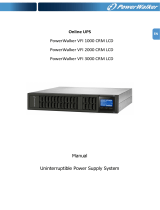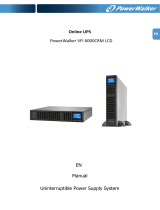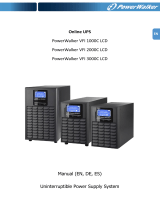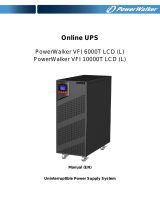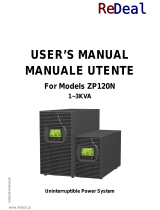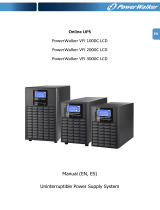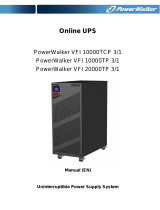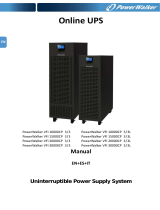Page is loading ...

-1-
Online UPS
PowerWalker VFI 1000T LCD
PowerWalker VFI 2000T LCD
PowerWalker VFI 3000T LCD
Manual (EN)
Uninterruptible Power Supply System

CONTENT
1. Safety and EMC Instructions .............................................................. 1
1.1 Installation ......................................................................................... 1
1.2 Operation .......................................................................................... 2
1.3 Maintenance, servicing and faults .................................................... 3
1.4 Transport ........................................................................................... 4
1.5 Storage ............................................................................................. 4
1.6 Standards .......................................................................................... 5
2. Description of Commonly Used Symbols ......................................... 6
3. Introduction .......................................................................................... 7
4. Panel Description ................................................................................. 8
5. Connection and Operation ................................................................ 12
5.1 Inspection ....................................................................................... 12
5.2 Connection...................................................................................... 12
5.3 Battery charge ................................................................................ 14
5.4 Turn on the UPS ............................................................................. 15
5.5 Test function .................................................................................... 15
5.6 Turn off the UPS ............................................................................. 15
5.7 Audible alarm mute function ........................................................... 16
5.8 Operation procedure of external battery for long backup time model
(“L” model) ....................................................................................... 16
6. Operating Mode for All Models ......................................................... 18
6.1 Line mode ....................................................................................... 18
6.2 Battery mode .................................................................................. 19
6.3 Bypass mode .................................................................................. 20
6.4 NO output mode ............................................................................. 21
6.5 EPO (Emergency Power Off) ......................................................... 22
6.6 ECO mode (Economy mode) ......................................................... 22
6.7 Converter mode .............................................................................. 22
6.8 Abnormal mode .............................................................................. 23

7. Setting by LCD Module ...................................................................... 24
8. Trouble Shooting ................................................................................ 27
9. Maintenance ........................................................................................ 31
9.1 Operation ........................................................................................ 31
9.2 Storage ........................................................................................... 31
9.3 Battery Replace .............................................................................. 31
10. Technical Data .................................................................................. 32
10.1 Electrical specifications ................................................................ 32
10.2 Operating Environment ................................................................ 33
10.3 Typical backup time (Typical values at 25°C in minutes:) ................ 33
10.4 Dimensions and weights .............................................................. 33
11. Communication Port ........................................................................ 34
11.1 USB ............................................................................................... 34
11.2 RS232 Interface(Option) ............................................................... 34
11.3 AS400 Interface (Option) .............................................................. 34
12. Software ............................................................................................ 36
Appendix: Rear panel ............................................................................ 36

1
1. Safety and EMC Instructions
Please read carefully the following user manual and the
safety instructions before installing the unit or using the
unit!
1.1 Installation
★ See installation instructions before connecting to the supply.
★ Condensation may occur if the UPS is moved directly from a cold
to a warm environment. The UPS must be absolutely dry before
being installed. Please allow an acclimatization time of at least
two hours.
★ Do not install the UPS near water or in damp environment.
★ Do not install the UPS where it would be exposed to direct
sunlight or near heat.
★ Do not connect appliances or items of equipment which would
overload the UPS (e.g. laser printers, etc) to the UPS output.
★ Place cables in such a way that no one can step on or trip over
them.
★ Assure to connect with the earth reliably.
★ Assure external battery source must be earthed.
★ Connect the UPS only to an earthed shockproof socket outlet.
★ The building wiring socket outlet (shockproof socket outlet) must
be easily accessible to close to the UPS.
★ With the installation of the equipment, the sum of the leakage
current of the UPS and the connected load does not exceed
3.5mA.
★ Do not block ventilation openings in the UPS’s housing. Ensure
the air vents on the front, side and rear of the UPS are not
blocked. Allow at least 25cm of space on each side.

2
★ UPS has provided earthed terminal, in the final installed system
configuration, equipotential earth bonding to the external UPS
battery cabinets.
★ An appropriate disconnect device as short-circuit backup
protection should be provided in the building wiring installation.
Please see the disconnect device specification in chapter 5.2.
★ Equipment the powered more than one source.
1.2 Operation
★ Do not disconnect the mains cable on the UPS or the building
wiring socket (grounded shockproof socket) during operation as
this would remove the ground to the UPS and of all connected
loads.
★ The UPS features its own, internal current source (batteries). You
may be electric shock when you touch the UPS output sockets or
output terminal block even if the UPS is not connected to the
building wiring socket.
★ In order to fully disconnect the UPS, first press the OFF button to
turn off the UPS, then disconnect the mains lead.

3
★ Ensure that no liquid or other foreign objects can enter the UPS.
★ Do not remove the enclosure. This system is to be serviced by
qualified service personnel only.
★ Remove the protective panel only after disconnecting the terminal
connections.
★ Use No. 12AWG (for 3K/KS output terminal), 90℃ copper wire
and 12 lb-in Torque force when connecting to terminal block.
★ Use No. 12 AWG (for 3KS input wire), 90℃ copper wire and
4.4 lb-in Torque force when connecting to terminal block.
1.3 Maintenance, servicing and faults
★ The UPS operates with hazardous voltages. Repairs may be
carried out only by qualified maintenance personnel.
★ Caution - risk of electric shock. Even after the unit is
disconnected from the mains power supply (building wiring
socket), components inside the UPS are still connected to the
battery which are potentially dangerous.
★ Before carrying out any kind of service and/or maintenance,
disconnect the batteries. Verify that no current is present and no
hazardous voltage exists in the capacitor or BUS capacitor
terminals.
★ Batteries must be replaced only by qualified personnel.
★ Caution - risk of electric shock. The battery circuit is not isolated
from the input voltage. Hazardous voltages may occur between
the battery terminals and the ground. Verify that no voltage is
present before servicing!
★ Batteries have a high short-circuit current and pose a risk of
shock. Take all precautionary measures specified below and
any other measures necessary when working with batteries:
- remove all jewellery, wristwatches, rings and other metal
objects

4
- use only tools with insulated grips and handles.
★ When changing batteries, replace with the same quantity and the
same type of batteries.
★ Do not attempt to dispose of batteries by burning them. It could
cause explosion.
★ Do not open or destroy batteries. Effluent electrolyte can cause
injury to the skin and eyes. It may be toxic.
★ Please replace the fuse only by a fuse of the same type and of
the same amperage in order to avoid fire hazards.
★ Do not dismantle the UPS, except the qualified maintenance
personnel.
1.4 Transport
★
★★
★
Please transport the UPS only in the original packaging (to
protect against shock and impact).
1.5 Storage
★ The UPS must be stockpiled in the room where it is ventilated
and dry.

5
1.6 Standards
* Safety
IEC/EN 62040-1
* EMI
Conducted Emission................................:IEC/EN 62040-2 Category C1
Radiated Emission...................................:IEC/EN 62040-2 Category C1
Harmonic Current.................................:IEC/EN 61000-3-2
Voltage Fluctuation and Flicker............:IEC/EN 61000-3-3
*EMS
ESD......................................................:IEC/EN 61000-4-2 Level 4
RS.........................................................:IEC/EN 61000-4-3 Level 3
EFT........................................................:IEC/EN 61000-4-4 Level 4
SURGE..................................................:IEC/EN 61000-4-5 Level 4
CS………………………………….……...:IEC/EN 61000-4-6 Level 3
MS………………………………………..: IEC/EN 61000-4-8 Level 3
Voltaje Dips………………………...…...: IEC/EN 61000-4-11
Low Frequency Signals..........................:IEC/EN 61000-2-2

6
2. Description of Commonly Used Symbols
Some or all of the following symbols may be used in this manual. It is
advisable to familiarize yourself with them and understand their
meaning:

7
3. Introduction
This On-Line-Series is an uninterruptible power supply incorporating
double-converter technology. It provides perfect protection specifically
for Novell, Windows NT and UNIX servers.
The double-converter principle eliminates all mains power disturbances.
A rectifier converts the alternating current from the socket outlet to direct
current. This direct current charges the batteries and powers the
inverter. On the basis of this DC voltage, the inverter generates a
sinusoidal AC voltage, which permanently supplies the loads.
Computers and periphery are thus powered entirely by the mains
voltage. In the event of power failure, the maintenance-free batteries
power the inverter.
This manual covers the UPS listed as follows. Please confirm whether it
is the model you intend to purchase by performing a visual inspection of
the Model No. on the rear panel of the UPS.
“L” Model: Extended backup time
Model No. Type Model No. Type
PowerWalker
VFI 1000T LCD
Standard
PowerWalker VFI
1000T LCD L
Extended
backup time
PowerWalker
VFI 2000T LCD
PowerWalker VFI
2000T LCD L
PowerWalker
VFI 3000T LCD
PowerWalker VFI
3000T LCD L

8
4. Panel Description
The Display Panel
Switch Function
ON-Button
Turn on UPS system:
By pressing the ON-Button “I” the UPS system is turned
on.
Deactivate acoustic alarm:
By pressing this Button an acoustic alarm can be
deactivated in the battery mode.
Do the battery test:
By pressing this Button the UPS can do the battery test
in the Line mode or ECO mode or Converter mode.
OFF-Button
When mains power is normal, the UPS system switches
to No output or Bypass mode by pressing OFF-Button
“ “, and the inverter is off. At this moment, if Bypass is
enabled, then the output sockets are supplied with
voltage via the bypass if the mains power is available.
Deactivate acoustic alarm:
By pressing this Button an acoustic alarm can be
deactivated in the bypass mode.
Select-Button
If the UPS system is No output or Bypass mode, the
output voltage and frequency and Bypass
disable/enable and operating mode could be selected by
pressing Select-Button, and confirmed by pressing
Enter-Button.
Enter-Button

9
The LCD Display
Display Function
Input Information
Indicates the input Line voltage value, which could
be displayed from 0 to 999Vac
Indicates the frequency value of input Line
voltage, which could be displayed from 0 to 99Hz
Indicates the input Line voltage is higher than the
SPEC range, and the UPS would be working in
Battery mode
Indicates the input Line voltage is lower than the
SPEC range, and the UPS would be working in
Battery mode
Output Information
Indicates the UPS output voltage value, which
could be displayed from 0 to 999Vac
Indicates the frequency value of the UPS output
voltage, which could be displayed from 0 to 99Hz
Load Information
Indicates the load percent in Watt or VA, only the
maximum value of them could be displayed from 0
to 199%
Indicates the load or the UPS output is short and
the UPS would shut down

10
Indicates the load is over the SPEC range
Battery Information
Indicates the battery voltage value, which could
be displayed from 0 to 999Vdc
Indicates the battery capacitance percent, which
could be displayed from 0 to 199%
Indicates the battery is over charged, and the
UPS would be switched to Battery mode
Indicates the battery is weak, and the UPS would
shut down soon
Mode/Fault/Warning code Information
Indicates the operating mode of the UPS, Mode
code or Fault code or Warning code could be
displayed, and the codes are illuminated in detail
in the following chapter
Inverter operating Information
Indicates the circuit of the inverter is working
Bypass operating Information
Indicates the circuit of Bypass is working
Output voltage and frequency and Bypass disable/enable
selection Information
The four value of the output voltage could be
selected when the UPS is in No output or Bypass
mode, and only one of them could be active in the
same time
The two frequency value of the output voltage
could be selected when the UPS is in No output or
Bypass mode, and only one of them could be
active in the same time
Bypass disable or enable could be selected when
the UPS is in No output or Bypass mode, and only
one of them could be active in the same time
(
1
)

11
(1) Here would become , , instead when the user
does operating mode of UPS setting.
“UPS” means the setting of normal inverter mode (Line mode).
“ECO” means the setting of economy mode.
“CVF” means the setting of converter mode.
The detail illustration of the three modes and the operation of the
setting would be presented in the following section.

12
5. Connection and Operation
5.1 Inspection:
Inspect the packaging carton and its contents for damage. Please
inform the transport agency immediately should you find signs of
damage.
Please keep the packaging in a safe place for future use.
Note: Please ensure that the incoming feeder is isolated and
secured to prevent it from being switched back on again.
5.2 Connection:
(1) UPS Input Connection
If the UPS is connected via the power cord, please use a proper
socket with protection against electric current, and pay attention to
the capacity of the socket: over 9A for PowerWalker VFI 1000T
LCD (L), over 17A for PowerWalker VFI 2000T LCD (L), over 26A
for PowerWalker VFI 3000T LCD (L). If the UPS is connected via
wires, it is recommended to select the 2.5mm
2
wire, and the
“GND” terminal should be grounded first by using the green/yellow
wire. The wiring is shown as the following.
The UPS System has an input breaker on the cabinet. But we still
recommend users to connect an external breakers or protective
components to the input terminals. It is recommended to select the
NFB (Non-Fuse Breaker) instead of the traditional combination kit
including breaker and fuse.
The system may be installed and wired only by qualified
electricians in accordance with applicable safety regulations!
When installing the electrical wiring, please note the nominal
amperage of your incoming feeder
.

13
When selecting the NFB, the user can refer to below table for
detailed information when installation.
Model No.
UPS INPUT NFB
VOLTAGE CURRENT
PowerWalker VFI 1000T LCD (L) 300Vac 10A
PowerWalker VFI 2000T LCD (L) 300Vac 20A
PowerWalker VFI 3000T LCD (L) 300Vac 32A
(2) UPS Output Connection
The output of the UPS is IEC socket-types. Simply plug the load
power cord to the output sockets to complete connection. Use one
cord for every 5A load.
Model No. Output Socket (pcs)
PowerWalker VFI 1000T LCD (L)
3 IEC type
PowerWalker VFI 2000T LCD (L)
6 IEC type
PowerWalker VFI 3000T LCD (L)
4 IEC type+Terminal block
The wiring configuration is shown
as the following procedure:
a) Remove the small cover of the
terminal block
b) Use 2.5mm
2
wires for wiring
configuration
c) Upon completion of the wiring
configuration, please check
whether the wires are securely affixed
d) Put the small cover back to the rear panel
Caution!
Do not connect equipment which would overload the UPS
system (e.g. laser printers)
Connection diagram

14
(3) EPO Connection:
User can select the polarity of EPO, EPO is Normally open as
default setting.
● Normally open
Normally the EPO connector is open on the rear panel. Once
the connector is closed with a wire, the UPS would stop the
output until the EPO status is disabled.
Disable the EPO status Enable the EPO status
● Normally close
Normally the EPO connector is closed with a wire on the rear
panel. Once the connector is open, the UPS would stop the
output until the EPO status is disabled
Enable the EPO status Disable the EPO status
5.3 Battery charge:
Fully charge the batteries of the UPS system by leaving the UPS
system connected to the mains for 1-2 hours. You may use the UPS
system directly without charging it but the stored energy time may be
shorter than the nominal value specified.

15
5.4 Turn on the UPS:
(1) With utility power connecting:
Press “I” button continuously for more than 1 second to turn on the
UPS, the UPS will get into the inverter mode, the LCD screen will
indicate the state of the UPS.
(2) Without utility power connecting:
If UPS is cold start without utility power connecting, user need to
push “I”button twice, first pushing “I” button is for UPS to get power,
and second pushing “I” button continuously for more than 1
second is for UPS to turns on, the UPS will get into the inverter
mode.In fact, the two pushing “I” button is to make further sure
user operation for turning on UPS, the LCD screen will indicate the
state of the UPS.
Note: The default setting for bypass mode is no output after
UPS is connecting utility power and breaker is turned on. This
can be configured by monitoring the LCD panel or firmware.
5.5 Test function:
Test the function of the UPS system by pressing the On-Switch “I” for
more than 1 second, the UPS would detect whether the battery is
connected or the battery is low. And the UPS could also do the test
automatically and periodically, the period time could be set by user.
5.6 Turn off the UPS:
(1) In Inverter Mode:
Press “ “ button continuously for more than 1 second to turn off
the UPS, the UPS will get into no output or bypass mode. At this
time, the UPS might has output if bypass is enabled. Disconnect
the utility power to turn off the output.
(2) In Battery Mode:
Press “
“ button continuously for more than 1 second to turn off
the UPS, the UPS will be turned off completely.

16
5.7 Audible alarm mute function:
If the alarm is too annoying in battery mode, you may press “I” button
continuously for more than 1 second to clear it. Moreover, the alarm
will be enabled when the battery is low to remind you to shutdown the
load soon.
If the alarm is too annoying in bypass mode, you may press “ “button
continuously for more than 1 second to clear it. The action doesn’t
affect the warning and fault alarm.
5.8 Operation procedure of external battery for long backup
time model (“L” model)
(1) Use the battery pack with voltage: 36VDC for PowerWalker VFI
1000T LCD L (3 pcs of 12V batteries), 96VDC for PowerWalker
VFI 2000T LCD L/ PowerWalker VFI 3000T LCD L (8 pcs of 12V
batteries). Connection of batteries more than or less than
required will cause abnormality or permanent damage.
(2) One hard wiring type battery terminal on the rear panel is used for
connecting the battery pack.
(3) The battery connection procedure is very important. Any
incompliance may result in the risk of electric shock. Therefore,
the following steps must be strictly complied with.
(4) Make sure the mains input is cut off, if there is a battery breaker
then turn it off first.
(5) Remove the small cover of terminal block, prepare the battery
cable which should be able to carry the current of >30A for 1000T
L, >22A for 2000T L, >33A for 3000T L, the cross section area
should be great than 4 mm
2
for all model. And battery wire color is
recommended as following:
+
++
+
GND
-
--
-
Red wire Green/Yellow wire Black wire

17
(6) The red wire is connected to the "+" terminal of the battery. The
black wire is connected to the "-" terminal of the battery. (Note:
the green/yellow wire is grounded for protection purpose.)
(7) Make sure the wires are fasten, install the terminal block cover on
the rear panel of the UPS.
(8) Connect the UPS to the load. Then, turn on the mains switch or
connect the power cord of the UPS to utility power supply, the
battery would start to be charged.
Model No.
DC breaker
VOLTAGE CURRENT
PowerWalker VFI 1000T LCD L 48Vac 50A
PowerWalker VFI 2000T LCD L 125Vdc 40A
PowerWalker VFI 3000T LCD L 125Vdc 60A
The Caution!
A DC breaker must be connected between the UPS and
external battery.
The Caution!
The output sockets of the UPS system may still be electrically
live even if the power supply system has been disconnected or
the Bypass switch is on “OFF” position.
/
